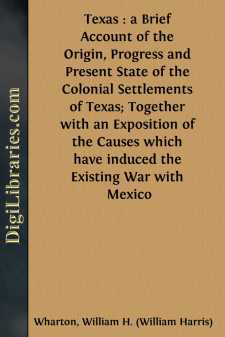Categories
- Antiques & Collectibles 13
- Architecture 36
- Art 48
- Bibles 22
- Biography & Autobiography 813
- Body, Mind & Spirit 142
- Business & Economics 28
- Children's Books 15
- Children's Fiction 12
- Computers 4
- Cooking 94
- Crafts & Hobbies 4
- Drama 346
- Education 46
- Family & Relationships 57
- Fiction 11829
- Games 19
- Gardening 17
- Health & Fitness 34
- History 1377
- House & Home 1
- Humor 147
- Juvenile Fiction 1873
- Juvenile Nonfiction 202
- Language Arts & Disciplines 88
- Law 16
- Literary Collections 686
- Literary Criticism 179
- Mathematics 13
- Medical 41
- Music 40
- Nature 179
- Non-Classifiable 1768
- Performing Arts 7
- Periodicals 1453
- Philosophy 64
- Photography 2
- Poetry 896
- Political Science 203
- Psychology 42
- Reference 154
- Religion 513
- Science 126
- Self-Help 84
- Social Science 81
- Sports & Recreation 34
- Study Aids 3
- Technology & Engineering 59
- Transportation 23
- Travel 463
- True Crime 29
Texas : a Brief Account of the Origin, Progress and Present State of the Colonial Settlements of Texas; Together with an Exposition of the Causes which have induced the Existing War with Mexico
Categories:
Description:
Excerpt
TO AN IMPARTIAL WORLD.
No. I.
The unconstitutional oppression long and unremittingly practised upon the colonists of Texas, having at length become insupportable, and having impelled them to take up arms in defence of their rights and liberties, it is due to the world that their motives, conduct and causes of complaint should be fully made known. In order to do this it will be necessary to explain the origin, progress and present state of the colonial settlements. Without parade or useless preliminaries, I shall proceed to the subject, as substance and not sound—matter and not manner are the objects of the present discussion. It is known at least to the reading and inquiring world, that on the dissolution of the connection between Mexico and Spain in 1522, Don Augustin Iturbide, by corruption and violence, established a short-lived, imperial government over Mexico, with himself at the head under the title of Augustin I. On arriving at supreme power, Iturbide or Augustin I. found that vast portion of the Mexican government, east of the Rio Grande, known by the name of Texas, to be occupied by various tribes of Indians, who committed incessant depredations on the Mexican citizens West of the Rio Grande, and prevented the population of Texas. He ascertained that the savages could not be subdued by the arms of Mexico, nor could their friendship be purchased. He ascertained that the Mexicans, owing to their natural dread of Indians, could not be induced to venture into the wilderness of Texas. In addition to the dread of Indians, Texas held out no inducements for Mexican emigrants. They were accustomed to a lazy pastoral or mining life, in a healthy country. Texas was emphatically a land of agriculture—the land of cotton and of sugar cane, with the culture of which staples they were wholly unacquainted; and moreover, it abounded in the usual concomitants of such southern regions—fevers, mosquitoes &c., which the Mexicans hated with a more than natural or reasonable hatred. Iturbide finding from those causes that Texas could not be populated with his own subjects, and that so long as it remained in the occupancy of the Indians, the inhabited parts of his dominions continually suffered from their ravages and murders, undertook to expel the savages by the introduction of foreigners. Accordingly the national institute or council, on the 3d day of January, 1823, by his recommendation and sanction, adopted a law of colonization, in which they invited the immigration of foreigners to Texas on the following terms:—
1st. They promise to protect their liberty, property and civil rights.
2d. They offer to each colonist one league of land, (4,444 acres) for coming to Texas.
3d. They guarantee to each colonist the privilege of leaving the empire at any time, with all his property, and also the privilege of selling the land which he may have acquired from the Mexican government, (see the colonization law of 1823, more especially articles 1st, 8th and 20th.) These were the inducements and invitations held out to foreigners under the imperial government of Iturbide or Augustin I....


